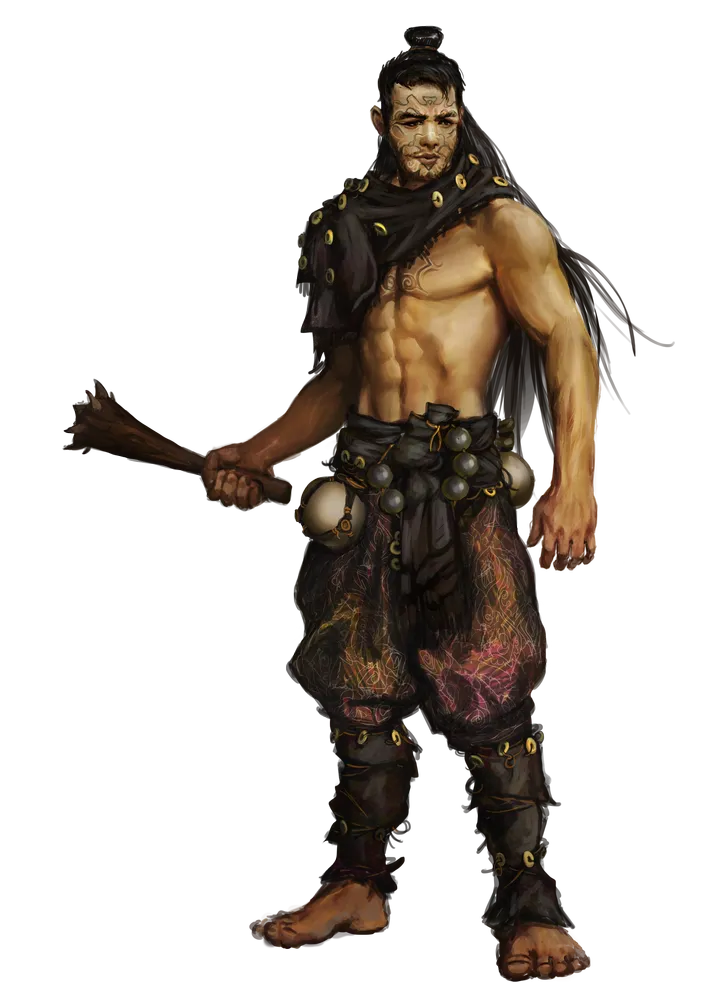
Yaksha
 Rare Spirit Yaksha Source Tian Xia Character Guide pg. 77PFS Note
Rare Spirit Yaksha Source Tian Xia Character Guide pg. 77PFS Note Yaksha characters must choose one of the listed heritages, and cannot choose a versatile heritage.
Divine spirits who emigrated to Golarion from the first world.Away from shining citadels and opulent palaces, reticent yakshas shelter Tian Xia's rural hinterlands from natural disasters and otherworldly depredations. Famed for resolute vows and prowess with primal magic, yakshas shield the indigent and protect the wilderness, punishing those who threaten either with bone-crushing fury. Yaksha legends recall their origins as divine spirits, overseeing the safety of roads and abodes in a primeval world of vast storm forests and titanic flame floods—the First World, a realm of boundless potentiality. During the Great Abandonment, when the gods left the First World, many yakshas rejected this exodus, instead staying to perform their duties as caretakers. Despite the realm's sudden dearth of divine power, the remaining yakshas swore primordial vows, allowing them to channel power from the nearby Creation's Forge into primal magic and transform swathes of the metamorphic First World into stable regions to provide refuge for destitute fey.
Yakshas faced great hostility in the First World; their sheltering of impoverished
fey didn't garner sympathy but instead drew scorn from others. Affronted fey aristocrats saw yaksha sanctuaries as a challenge to their authority, and the stolid plainness of yaksha domains offended the fey's aesthetic sensitivities. Thus, yaksha communities increasingly became targets and, at some uncertain time, were banished to the Universe. Some of these exiles came to settle in obscurity amid Tian Xia's forests, a fact that planar scholars record as a tragedy. After all, if these yakshas had left alongside the gods earlier, they would surely enjoy greater prominence and privilege on Golarion.
Yet most yakshas spurn such sentiments, instead expressing quiet pride in fulfilling their vows where even the gods failed. Yakshas view their departure not as a dereliction, but an execution of duty. Their histories claim this egress paved the way for other persecuted fey to escape, and thus their relocation aligned with their obligations. Many yakshas still enjoy amicable relations with fey emigrants, protecting them and their descendants from First World pursuers. Just as many wander bucolic back roads and shadowy swamps, guiding lost travelers, repairing flood-torn bridges, or simply nurturing the green, growing earth—a fundamental pillar of the land. Such stalwart custodianship has earned the reclusive yakshas a reputation for being hospitable, if enigmatic, guardians of the wild.
If you want to play a character who's a guardian spirit and has complex relationships with gods and fiends alike, swears primordial vows to uphold noble duties, and acts on behalf of the humble and forgotten, you should play a yaksha.
You Might...
- Have sworn vows to safeguard little-known rural communities or remote wildernesses.
- Be stoic yet not unfeeling, accepting others' burdens to make sense of your own identity.
- Inordinately enjoy puns and wordplay, being so familiar with carefully worded vows.
Others Probably...
- Gain amusement from trying to trick you into agreeing to promises to do chores or petty favors.
- Assume you to be tireless and self-sacrificing and expect you to never complain about responsibilities.
- Disdain you as simpleminded and unsophisticated and assume you have little interest in etiquette or fashion.
Physical Description
Yakshas aren't born flesh-and-blood into the world. Instead, these guardian spirits occasionally manifest when two conditions are met: a surfeit of positive emotions must exist within an untamed area, and a great need for protection must arise within this land. When both conditions are met, yakshas might appear to answer common folk's prayers and protect the beleaguered land.
Yakshas often appear as humans with strikingly distinctive physiques; while some stand around 7 feet with powerfully muscled statures, others boast robust portliness and stand no more than 4 feet. All possess luxurious, banyan-like manes of hair that they bind in topknots or under headscarves. The primal power of yaksha vows can sustain them for a thousand years. Ironically, due to perilous nature of their vows, few yakshas live more than a century.
Society
Most yakshas eschew pomp and disregard civilization's excesses. Instead, they gather in provincial sects or assimilate among borderland peoples. While some of the First World's yakshas reigned from kingly temple-cities, Tian Xia's yakshas discourage such grandiosity. Contemporary yakshas attribute love of lucre and prestige as temptations that led some of their number to join the Great Abandonment. Gathering in large numbers also attracted the wrath of the cruel. When the First World's yakshas sheltered weaker fey within their temple-cities, offended fey gentry launched war after war upon them. Thus, most yakshas keep to the margins of society today and do what they can to help the world around them. Where the poor and humble can be found, yakshas might also dwell to serve as protectors or avengers, enshrined in the lowborn's forlorn hopes and desperate wishes.
Beliefs
As guardian spirits, many yakshas are drawn toward benevolence. Their existence advocates adhering to vows and emphasizes empathy and service, which nurtures compassion. Few, though, are both kind and disciplined; witnessing divine desertion and imperial injustice has caused yakshas to doubt the efficacy and fairness of a hierarchal society, and such skepticism makes it hard for them to feel impartial about such communities. It isn't unheard of for yakshas to act recklessly and without consideration for their vows. Wildhaired, ferocious yakshas have been known to devour entire taboo-violating villages, and
Iroran stories mention forest monastics taming such marauding yakshas to lead them upon the path of repentance and enlightenment.
The popularity of Iroran teachings among otherwise religion-averse yakshas gives these stories credence. Irori's lessons of self-mastery sit easily alongside yaksha discipline, and Irori's mortal origins helps temper yakshas' typical disdain for divinity.
Yamatsumi's worship is also not uncommon, though yaksha adherents often couch prayers as respectful requests to a more powerful sibling rather than supplications to a superior. While yakshas stridently oppose
Lady Nanbyo's calamitous doctrines, they reserve their greatest antipathy for other god-spurning beings, and they relentlessly battle the cults of rakshasa immortals and asura ranas.
Popular Edicts guide the lost and weary, provide refuge to the weak and downtrodden, swear primordial vows
Popular Anathema break a vow, gorge yourself on the extravagance of civilization
Names
Ahimsaka, Fanren Meng, Hariti, Iryoku, Janavasbha, Kyoju- Yasha, Mahavana, Osugi, Pattana, Tataka, Wu Shizhi
Yaksha Mechanics
Hit Points
8
Size
Medium
Speed
25 feet
Attribute Boosts
Constitution
Charisma
Free
Attribute Flaw
Intelligence
Languages
CommonFeyYakshaAdditional languages equal to your Intelligence modifier (if it's positive). Choose from
Empyrean,
Diabolic,
Nagaji, Tang,
Tengu,
Vudrani, and any other languages to which you have access (such as the languages prevalent in your region).
Low-Light Vision
You can see in
dim light as though it were
bright light, so you ignore the
concealed condition due to dim light.